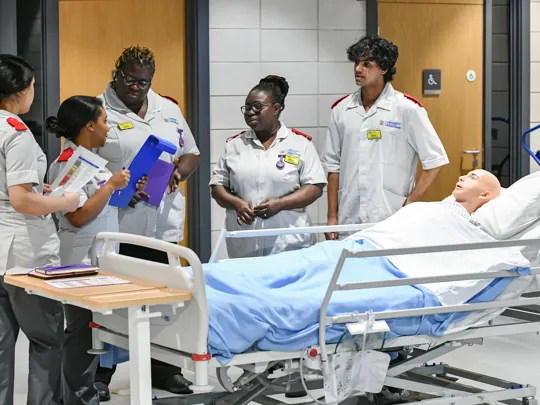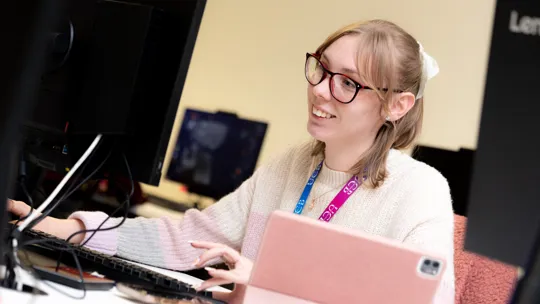July 2024
New postgraduate nursing courses launched to support community health and social care
By Sean Madden
Share post:Read time: approx 7 mins
University College Birmingham has significantly expanded its offering in community nursing with the launch of three "vital" post registration courses.
For the first time, the School of Health and Food will offer postgraduate nursing programmes in the form of an MSc Adult Social Care Nursing and an MSc Homeless and Inclusion Health Nursing. These programmes have been developed for community and social care Registered Nurses, both built around the new community Specialist Practice Qualification (SPQ) in health and social care.
Each programme is written by experts in the field and has been approved by the Nursing and Midwifery Council (NMC), providing an up-to-date and evidence-based curriculum specifically for UK-registered nurses working across a wide variety of health and social care settings, including private and voluntary health and social care services.
The MSc Adult Social Care Nursing qualification will enable registered nurses working across social care environments, especially in nursing homes and community nursing teams, to use specialist knowledge and skills within their workplace to lead and manage complex care situations and workloads.
Adult social care nursing nurses are normally the lead clinicians within nursing homes and as such, carry a significant burden of responsibility for the clinical and holistic care of residents within the home, as well as having a leading management role working within the legislation and policies of the organisation and local authorities.
The qualification will be beneficial for nurses in these roles and will provide value and an assurance for owners/operators of nursing and residential homes of all sizes. It will recognise and acknowledge the expertise and high-level complex care that adult social care nurses provide for their residents and families.
Paula Du Rand, manager of Kineton Manor Nursing Home in Warwick, who helped develop the programme, said the course was vital. "I'm so happy to see the hard work in putting together this course come to fruition," she said.
"It was a privilege to provide input and be part of the network supporting its development. The programme is flexible, and its validity shown through the various partnership events integral to its creations - including the contributions made by students.
Homelessness and housing insecurity in the UK is on the rise. The official ‘street count’ for England has risen 164% since 2010 (QNI, 2023).
The MSc Homeless and Inclusion Health Nursing programme provides education and practice opportunities to Registered Nurses who support people of no fixed abode, individuals with drug and alcohol dependence, vulnerable groups, including migrants, refugees, asylum seekers, undocumented migrants, Gypsy, Roma and Traveller communities, sex workers, people in contact with the justice system and victims of modern slavery and other socially excluded groups.

The first cohort of students will be welcomed onto the master’s degrees in September 2024, and with flexibility essential to those working in a busy healthcare setting, students can choose to study on either a full-time (18 months) or part-time (3 years) basis or on a two-year apprenticeship programme.
Students will take a range of core modules and option modules depending on their personal and professional aspirations, as well as carry out a service improvement project aligned to their area of specialist practice.
Successful completion of their MSc programme will grant candidates the annotation of Specialist Practice Qualification on the NMC register, and as the programmes are mapped to the QNI Field Specific SPQ Standards and aligned to the 4 pillars of Advanced Practice (HEE, 2017), successful students will also receive certification from the Queen’s Nursing Institute (QNI).
Additionally, a new module covering Independent and Supplementary Prescribing (V300) will be offered to Registered Nurses and can be undertaken as part of the MSc programmes or as a stand-alone module.
The V300 is a 40-credit module that provides an excellent opportunity for professional advancement as students learn to prescribe safely, appropriately and cost-effectively in their role as NMC registered nurses, community specialist practitioners (SPQ) or specialist community public health nurses (SCPHN).
On completion of the module, staff are eligible to be recorded as an independent/supplementary prescriber (V300) on the NMC register and prescribe within their field of practice.

V300 student Michael Blackham
Award-winning Adult Nursing graduate and practising Registered Nurse, Michael Blackham, was one of the first to enrol on the new V300 programme and praised the course.
"The V300 benefits any nurse working within acute, community or independent clinical care," said Michael, who was in the first Adult Nursing BSc (Hons) cohort at the University and graduated in 2023. "The qualification holds massive value as it allows a nurse to prescribe medication within their scope of practice, gives them greater autonomy and an increase in pay. It's so beneficial for a patient's continuity of care as staff are on-hand to prescribe time-sensitive or potentially lifesaving medication."
"There are so many reasons to choose this university. It has marvelous student support, staff act upon feedback and they do their utmost to fulfil our personal requirements.
"The Health Skills and Simulation Suite is fully equipped and utilised in an appropriate way, with awesome post-graduation support and genuine care along the way."
Students learn from experienced and specialist colleagues in a clinical setting through a combination of methods including lectures and seminars, small-group teaching sessions, practical sessions, and workshops.
As the programmes are 50% practice-based, experienced practice supervisors work with students and assess them against relevant competencies. Students also benefit from resources available online through the virtual learning environment (VLE), weekly sessions from Graduate Advantage, and use of the University’s state-of-the-art Health Skills and Simulation Suite, which includes a six-bed hospital ward complete with Anatomage table and audio/visual equipment.
Through this integrated approach, emphasising both theory and practice, each programme will provide students with the skills and knowledge necessary to increase confidence and competence, enabling them to make higher-level clinical decisions for the benefit of patients and clients.
Find out more about our postgraduate nursing courses, as well as undergraduate degrees, in the Department of Health and Nutrition.
"We integrate evidenced-based leadership principles into practice and theory, preparing students for clinical assessment and elevating practice with harmonious consideration of therapeutic and clinical interventions. Students will have a psychologically safe learning environment, underpinned by academic excellence in a salutogenic approach."
Check out our latest news stories

Former RACA chef apprentice wows Alpine resort guests alongside MasterChef winner
A former Royal Academy of Culinary Arts (RACA) apprentice worked with MasterChef winner and ex-student Dan Le…
Read more
Students help revitalise Great Malvern visitor strategy for the next generation
Six students are working with Malvern Hills District Council to deliver a new tourism and hospitality project.
Read more
Sixth formers explore Singapore's sustainability on trip of lifetime
Twenty sixth formers from University College Birmingham explored Singapore's groundbreaking work in sustainability on an e…
Read more
University in running for top regional sustainability excellence award
University College Birmingham has been shortlisted for a Midlands Sustainability Excellence Award.
Read more
Sun, sights and sustainability for students on Montenegro trip
The trip gave students an insight into sustainable tourism in this up and coming destination.
Read more
Blog | Our 7 top tips for exam preparation
Exams just around the corner? Feeling anxious, or like you’re not sure how to prepare? Don’t worry! Our top tips will help you navigate this stressf…
Read more